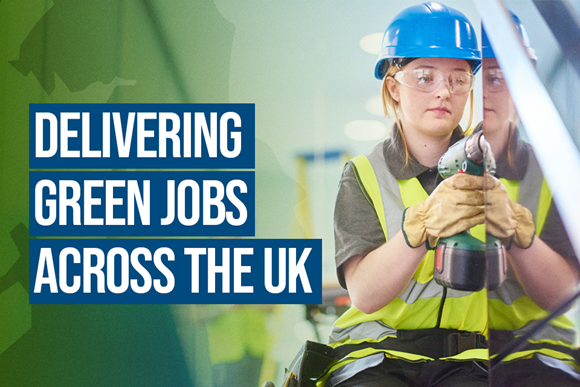
11 May 2022
Green jobs delivery steps up a gear

- UK’s new Green Jobs Delivery Group holds inaugural meeting to help power UK’s green industrial revolution
- Leaders from business, industry, trade unions and academia to act on upskilling and training green workforce of the future
- Group is vital step in creating and supporting up to 480,000 skilled well-paid green jobs by 2030
Energy Minister Greg Hands today (11 May) co-chaired the first meeting of the country’s first ever dedicated group for creating UK green job opportunities.
The Green Jobs Delivery Group will support the delivery of up to 480,000 skilled green jobs by 2030 that will be created and supported thanks to Government policies set out in the Prime Minister’s Energy Security Strategy and Net Zero Strategy.
The UK’s green industrial revolution is a key part in the Government’s plan for growing the economy and creating high-skilled, high-wage jobs across the country. The Group will help ensure the UK has the skilled workforce it needs to build clean industries in our industrial heartlands and transition to cheaper renewables in the face of rising fossil fuel prices. It will also ensure that workers, businesses and local areas are supported throughout the transition in eliminating the UK’s contribution to climate change by 2050.
The Group is co-chaired with E.ON UK Chief Executive Michael Lewis, and comprises representatives from the worlds of business, industry, trade unions and academia.
The Government’s support for the UK’s green industrial revolution will help unlock up to £100 billion of private investment by 2030, by which point 95% of electricity could be low carbon. It means the UK will need a lot more skilled workers to build things like electric vehicles (EVs), manufacture and install heat pumps, hydrogen boilers, wind turbines and solar panels, as well as insulate British homes and buildings.
Nearly 68,000 green jobs across the UK economy have already been created and supported or are in the pipeline since the Prime Minister’s Ten Point Plan in November 2020 – including in electric vehicle manufacturing in Sunderland, Hydrogen facilities in Teesside, and offshore wind in Northumberland, Yorkshire and Humber. The Delivery Group will look at ways of ensuring all sectors of the economy and parts of the country can benefit from the green transition.
Chair of the Delivery Group and Minister for Energy and Clean Growth, Greg Hands, said:
“We will need tens of thousands of skilled workers for our clean transition and to boost energy security; and well-paid green jobs will help with the cost of living. Spreading opportunity by levelling up all parts of the country.
“The UK’s most important asset is its workforce. Our new Delivery Group will help us ensure employers have the know-how and employees the skills to drive our transition to becoming the world’s leading green economy.”
Co-Chair of the Delivery Group and CEO of E.ON UK, Michael Lewis, said:
“Our economy is on an historic journey towards becoming more environmentally friendly than ever. Our green transition is affecting every single sector and we need to ensure green jobs are open to everyone.
“The UK needs a future pipeline of talent to power it towards net zero and this Delivery Group will ensure industry and government work together, so we have the diverse, skilled and resilient workforce needed for the future.”
Over the last three decades, the UK has achieved record clean growth, with emissions tumbling by 44% - faster than any G7 nation - while the economy has grown by almost 80%. There are already over 430,000 jobs in low-carbon businesses and their supply chains across the country.
The government’s recent British Energy Security Strategy set out how Great Britain will accelerate the transition to renewables, supporting an extra 40,000 green jobs. Key ambitions include:
- a significant acceleration of nuclear, including flexible Small Modular Reactors, delivering up to 8 more reactors across the next series of projects;
- a fivefold increase in our offshore wind capacity to up to 50GW by 2030;
- a doubling of up to 10GW of low carbon hydrogen production capacity by 2030, helping power industry and transport; and
- increasing the UK’s 14GW of solar capacity fivefold by 2035.
Chief Operating Officer of Make UK, Ben Fletcher, said
“Manufacturers are leading the charge in the green revolution to our Net-Zero target and ensuring that they can meet their skills need will be crucial to our economic success.
“We are pleased to join the Green Job Delivery Group which can collectively deliver the growing demand for green skills now and in the future.”
The Delivery Group follows a recommendation by the Green Jobs Taskforce, which concluded that every job has the potential to be green, and meets a commitment in the Government’s Net Zero Strategy.
The UK government has already rolled out a range of initiatives and skills programmes to build low carbon industries across the country. This includes:
- working with employers to boost green apprenticeship opportunities;
- free adult skills training for those without qualifications or any adult in England earning under the National Living Wage annually (£18,525) or is unemployed;
- free adult skills training for those without qualifications; and
- green skills bootcamps - providing free, flexible training courses for adults with a fast-track interview with local employers in companies retrofitting homes, installing solar power or developing greener transport.
Contact Information
Edward Davies
edward.davies@energysecurity.gov.uk
Notes to editors
- The Delivery Group will be made up of representatives from business., along with ministers from various departments. Those attending the inaugural meeting were:
- The Rt Hon Greg Hands MP, Minister of State (Minister for Energy, Clean Growth and Climate Change)
- Mims Davies MP, Parliamentary Under Secretary of State (Minister for employment)
- Alex Burghart MP, Parliamentary Under Secretary of State (Minister for skills)
- Rebecca Pow MP, Parliamentary Under Secretary of State (Minister for Nature Recovery and the Domestic Environment)
- Michael Lewis, CEO, E. ON Energy and Chair, Energy Utilities and Skills Partnership (EUSP)
- Martin Baxter, Director of Policy and External Affairs, Institute for Environmental Management and Assessment (IEMA)
- Shireen Chambers, CEO, Institute of Chartered Foresters
- Andrew Charlton-Perez, Professor, Head Maths, Physical and Computational Sciences, University of Reading
- Jane Cooper, Government Relations, Orsted
- Jennifer Coupland, Director of Professional & Technical Education, IfATE
- Simon Farrell, Head of Apprentice and Associate Training, BMW and Automotive Skills Group
- Sue Ferns, General Secretary, President, Trade Union Congress
- Ben Fletcher, Chief Operating Officer, MakeUK
- Daniel Griffiths, Chief Human Resources Officer, BritishVolt
- Sally Hayns, CEO, Chartered Institute of Ecology and Environmental Management (CIEEM)
- Shevaun Haviland, CEO, British Chamber of Commerce (BCC)
- Helen Higgs, Head of Construction Workforce Skills, EDF
- Greg Jackson, Founder and CEO, Octopus
- Kate Kennally, CEO, Cornwall, and climate change lead at the Association of County Councils
- Andy Lane, Vice President CCUS / Cluster Lead, BP
- Paul de Leeuw, Director, Robert Gordon University Energy Transition Institute
- Shelagh Legrave, FE Commissioner, Further Education
- Nick Molho, Executive Director, Aldersgate Group
- Alex Payne, Chief Executive, Land Based Colleges and Universities Aspiring to Excellence
- Adam Read, President, Chartered Institute of Wastes Management (CIWM)
- Ian Rippin, Chief Executive -MCS Charitable Foundation
- Paul Rolfe, Chief Commercial Officer, Chichester College Group
- Steve Scrimshaw, Vice President, Siemens Energy Limited UK & Ireland
- Shaun Spiers, Executive Director, Green Alliance
- David Thomas, CEO, Barratt Homes
- Anna Valero, ESRC Innovation Fellow, Centre for Economic Performance and Diffusion, LSE (Associate Grantham Institute)
- Ian Woodcroft, Head of Policy and Government Relations, Construction Industry Training Board (CITB)
- The Green Jobs Taskforce, established by but independent of Government, published its review into the sector in July 2021, which can be accessed here.
- The Government already has a number of initiatives to support green jobs. More details here (Green Jobs and Skills chapter)
- Since the launch of the 10 Point Plan in November 2020, 68,000 green jobs have been created and secured, including:
- up to 4,100 jobs and around £1.6bn of investment announced in major port and manufacturing infrastructure through the Offshore Wind Manufacturing Investment Support scheme (up to 170 jobs at JDR Cables’ new high voltage cable factory in Blyth and 270 safeguarded at their existing facility in Hartlepool, plus up to 750 jobs at SeAH Wind’s planned factory in Teesside).
- 6,200 jobs in Sunderland (including more than 900 new Nissan jobs and 750 new jobs at the Envision-AESC Gigafactory) thanks to £423m investment by Nissan, as part of a £1bn investment with partners Envision AESC and Sunderland Council, to create EV36Zero - a flagship Electric Vehicle (EV) Hub in the North East.
- supporting approximately 45,000 jobs in greener buildings through schemes such as the green homes grant vouchers and public sector decarbonisation scheme.

